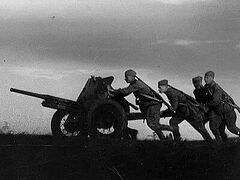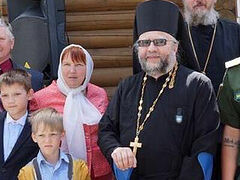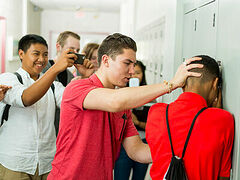Last December, His Holiness Patriarch Kirill gave out awards for courage for carrying out pastoral service in wartime to priests from Moscow and the Moscow region who had returned from their missions to the Special Military Operation zone. Among those awarded the medal of the holy Right-Believing Prince Dimitry Donskoy was a postgraduate student of the Sretensky Theological Academy, Priest Igor Ivanov. He talks about how people change during war, and why priests are needed in the war zone.
—They say that there are no atheists in the foxholes. Is that true? Is a person closest to God during war?
—Yes, it is true. But we should understand that war is big, and sixty to seventy percent of the contingents are not directly involved in combat operations. These are staff officers, signalmen and many others. True, they perform important tasks, take risks, there are losses and examples of heroism everywhere. But they do not take part in warfare. Even artillerymen, although they are at a distance, take part in the counter-battery struggle and counteract sabotage-and-reconnaissance groups. Therefore, it matters where a particular serviceman was and what he saw. Archpriest Mikhail Vasiliev (†November 6, 2022), a Hero of Russia, said that a soldier’s faith depends on how much burning iron has flown over him. I have not met atheists in subunits that are on the front line. Everyone takes Communion there.
—Fr. Igor, tell us about your personal experience of being in a combat zone.
—I went once last summer with Fr. Mikhail Vasiliev and for the past six months I haven’t been able to go again. There are a lot of bureaucratic issues related to my status that don’t give me such an opportunity. Many things have changed now. Perhaps in the near future everything will be sorted out and it will be easier to go. All being well, I will go soon. I currently study and serve at the Church of Sts. Ilya Muromets and Barbara in the village of Vlasikha near Moscow at the headquarters of the Strategic Rocket Forces where Archpriest Mikhail Vasiliev was rector.
It was easier with Fr. Mikhail. He would gather priests, hold full-fledged lessons, explained what to take with you and how to behave. There are many specifics that a priest should take into account. For example, you should know what a “petal” mine looks like. This kind of mine is small, but very cunning. It is hard to detect it in the grass. It probably won’t kill you, but you can lose your leg. There was the following situation: a priest saw a soldier who had found this type of mine and was trying to put it into his bulletproof vest. The priest shouted: “What are you doing?!” He replied: “It is an armored element, Fr.. I found it and decided to reinforce my bulletproof vest.” He blessed him, took out the “petal” mine carefully and everyone was safe and sound, thank God.
—Do people get used to these dangerous factors?
—There is always fear, but you get used to everything. After staying there for a few days you can tell by the sound when a shell is flying towards you and when one is flying away from you. It is useful to have a musical ear there. If the sound fades, it means that it is not flying towards you, and if it gets louder, the mine may hit you. But its pitch will only rise for a fraction of a second, and you must have time to take cover. Those who have been to a war zone for a long time are well-versed in sounds and everything else. People get used to this life.
 Prayer Service at Borodino battlefied, 1812
Prayer Service at Borodino battlefied, 1812
—Do many priests want to go there?
—I personally know many, especially from the provinces, but most of them can’t. When you are the rector of several churches, who will serve if you go? Besides, not every priest is able to perform this kind of service, much as they would like to.
—What qualities are you expected to have in order to be useful there? It seems that priests are usually not timid and know how to communicate with people.
—When I was there, there was a priest who could not string two words together. He talked about nothing for a very long time and did not deem it necessary to prepare for sermons. He said that the Holy Spirit would teach him. It was hard to listen to him. I always spend five hours preparing for my sermons, and everyone likes them. But this priest will bring forty people to church, while I will bring none. I don’t know how it works. Various priests are probably needed there. But you definitely need to have skills and proper training, especially in tactical medicine.
—What does a priest have to do in the war?
—The same things as in peacetime. But you talk to soldiers—they have seen life and have been through a lot.
—How do you help people whose relatives and friends were killed? What words can you find?
—It depends. Most often you don’t have to say anything. Sometimes a person just needs to have his say. As a rule, experienced soldiers do not pour out their souls to each other. This is due to many specifics. And people always need to pour out their souls. Chaplains are specially trained for this. If I see that a person just wants to speak out, and I listen to him attentively. If a specific request appears, we communicate. Each priest will have his own experience of building a dialogue, and each experience has the right to exist if it helps a person and inspires him.
—You were in the Special Military Operation zone for ten days. Which fatigue was greater on your return: emotional or physical?
—Emotional. I hardly felt any physical fatigue. And you get used to the closeness of death quickly. At first it’s very scary, especially if you get into some trouble. Then you gradually get used to it. It scares you, but it doesn’t bother you so much anymore. You get tired of the fact that there is a very large flow of people and from morning to night you speak to them. We need at least 500 chaplains to go there at least once a month. Now there are very few of them, at best—a few dozen.
—You said that people change significantly during war. How does this happen?
—We should understand that war is a catalyst. If a person is a scoundrel, he will become an even worse scoundrel. If a person is decent, then he will become a hero. War intensifies our inner fears, virtues and sins.
Fr. Mikhail Vasiliev had a lot of work with troops at the parish, and this work is carried on by the current rector, Archpriest Alexander Soldatenkov, with conscripts, contract soldiers, officers, mobilized soldiers and in hospitals.
—Tell us more about Fr. Mikhail. How long did you know him?
—I dreamed of serving with Fr. Mikhail from the very beginning of my life in the Church. When I entered the seminary, I watched various materials with him and was sure that if I became a monk, then only like Vladyka Tikhon (Shevkunov), and if I became a married priest, then like Fr. Mikhail. I didn’t do anything on purpose to get to him. And last year, when the Special Military Operation began, I decided that I should be there with our soldiers. I came to the Military Department, and I was invited to a class for chaplains at one of the military schools. I arrived. Fr. Mikhail was there—I saw him in person for the first time in my life. His lessons were thought out very carefully—always with a detailed story and media resources.
—Did he prepare everything himself or did he have assistants?
—Basically, he did everything himself. But Fr. Sergei Yakimenko, who recently became rector of the Church of the Annunciation at the headquarters of the Airborne Forces in Sokolniki, made a large contribution as well. So, let’s go back to our first meeting: Fr. Mikhail held a class. Then Fr. Sergei gave instructions on the equipment that we were supposed to take with us. There were about twenty priests sitting there, and Fr. Mikhail approached each of them and asked if they would go to the Special Military Operation zone. I thought: “I hope he won’t come up to me!” But he came up and asked me, and I answered: “How much time do I have to think?” He laughed and went on. In the end, I raised my hand. It so happened that Fr. Mikhail invited me, and I served under his direction for about six months.
—What kind of person was he?
—I respect and love him immensely, but anyone will say that he was a very difficult man. It wasn’t easy with him. It was difficult to work, to talk and to serve with him. At the services priests know what the next exclamation or action will be, but he could change it at any time. He was very demanding and unpredictable, yet very erudite and self-sacrificing. It’s hard to say how many missions he had: He spent more time on the front and in the field than at home. Now he would go to the Far East to the Marines, now somewhere else. He was busy with something all the time. In this respect, he and Vladyka Tikhon are very similar. I miss him very much…
—How does your spouse feel about the fact that you have chosen such a dangerous path following his example?
—Some priests tell their wives they are going to study, but in fact they are going to the Special Military Operation zone. I was also advised not to tell my wife the whole truth so that she wouldn’t worry, but my Father Confessor said it wouldn’t be fair and we should make such a decision together. Of course she didn’t want it, but she didn’t try to make me change my mind. The most important thing is that, realizing the need to go there, she supported me. I wouldn’t have gone without her consent. Of course, my Father Confessor was right. She read Akathists for me daily, and I felt it. She certainly worried for me... Recently our third child was born. The eldest ones are now five and three years old.
—Where are you from?
—I was born in Vorkuta.1 My mother and sister are still there, but they are going to move. After school I studied in the village of Vychegodsky in the Arkhangelsk region to become an assistant train driver, and then I worked for three years with a break for the army. After the army I moved to Novorossiysk, but regretted it; it was too hot there compared to the Arctic. There I integrated into the Church life and decided to enter the Sretensky Seminary. I finished my bachelor’s degree and then went on assignment to Tomsk for three years. I completed my master’s degree there, came back here and am now a second-year postgraduate student. The subject of my future thesis is related to military service: “An Educational Training Model for Clergymen for the Spiritual and Moral Strengthening of Servicemen in a Combat Zone.”
—What is military education for the clergy?
—There is an interest among soldiers in priests visiting them as often as possible; moreover, so that they would not just come, but give full-fledged pastoral care to the personnel. But there is no base to train priests for this. The seminary has only one semester of such education, which is very little. And it is also necessary to adapt it to military conditions. Therefore, we are now trying to make this base.
 Service at the main cathedral of the Armed Forces of the Russian Federation
Service at the main cathedral of the Armed Forces of the Russian Federation
—Tell us about the survey you are conducting among soldiers.
—I believe there should be a study that confirms that our ministry is not mere empty words. It must be documented. Chaplains are needed; they do important work there, which helps people. Our most combat–ready type of troops is the airborne troops. They take part in all conflicts. Until recently, Fr. Mikhail pastored the Airborne Forces. The two most churched types of troops are the Strategic Rocket Forces and the Airborne. Fr. Mikhail Vasiliev worked in both with the priests he had trained. There is also personal experience that shows that if a chaplain works with a subunit, it feels better. Military personnel have better mental stability, inner state and combat training. They are more motivated. We want to explain to the military commanders: you may not believe in God, but if you want your army to be combat-ready, then you need not only those who will train soldiers to fight the enemy, but also those who will train them to live and die for the faith and the Fatherland. Chaplains are needed. It remains to prove it scientifically, as it were.
Fr. Mikhail Vasiliev used to say that there should be a separate military diocese with a bishop, so that chaplains would not be dependent on an ordinary diocesan bishop. They should receive salaries from the Ministry of Defense, be on the staff and be socially protected. Now, if you go to a war zone for six months with your subunit, the rector is not obliged to pay you any money, and your family wants to eat every day. But, of course, most rectors and bishops understand the importance of this kind of service, although it doesn’t solve the problem. We should resolve this issue at the legislative level.
—What did you speak about with soldiers before combat?
—For example, I would ask them: “Which one of you is the youngest?” Eighteen-year-olds would raise their hands. Then I would ask them how old St. Alexander Nevsky was when he became a prince. They would answer: “Sixteen.” “And how old was he when he won his famous victory on the Neva?” “Nineteen.” He was twenty-one when he won the Battle on the Ice. And at his age he decided the fate of our state for 1000 years to come! And today each of them is making history in his place and in his rank and is responsible for the future for years to come. Then I would speak about the responsibility they bore. And after that each of them would think of himself no longer as Petya or Vasya, who smoked cigarettes behind his mother’s back, but as of another Alexander Nevsky, who was deciding the fate of his Fatherland. Their eyes would light up.
—Do people’s attitudes towards death change during war?
—Of course, they do. It’s one thing to live far from all this in comfortable conditions, but it’s another thing when you can die at any moment. And it doesn’t matter how good you are as a specialist or how many hours of training you have had. It won’t save you from a random shell. You will die without even having time to get to the war zone.
There you begin to feel life in a different way. The only thing that is more terrible than death is to wait for it and do nothing. I grew up in Vorkuta in a criminal area, saw a great deal and it was really scary. But there I can’t show fear, because my task is to encourage others. I tried to think about my duty, my wife and children. I understand that these are the most precious things I have in my life, and everything else is trifles. Perhaps most people think the same way and reassess many things.
—Do soldiers talk about cases when they reconsidered their outlook on life?
—Yes, everyone has their own story. Especially in hospitals, where the situation is calmer, you can hear plenty of such stories. There were cases when a splinter of a shell hit an iron cross. A tankman whom Fr. Mikhail knew hung an icon of the Theotokos on the tank’s turret from the inside, and a 155-millimeter shell hit it, but did not penetrate the armor. The tank crew members were severely concussed, but survived. Of course, this might have happened for other reasons. A lot depends on the angle, the specific location on the tank and many other factors, but the fact remains. No matter how “successful” circumstances turn out, soldiers feel the hand of God in this. The soldier had an ordinary paper icon of the Theotokos hanging in the tank, which he now always takes with him to other equipment.
This is how God guides His people wherever they find themselves, especially in war.






